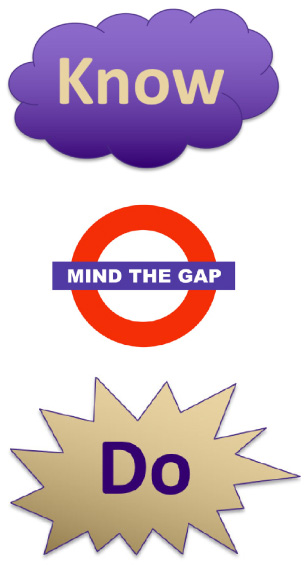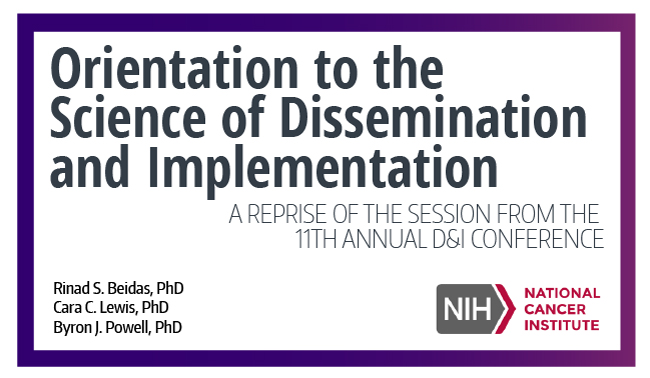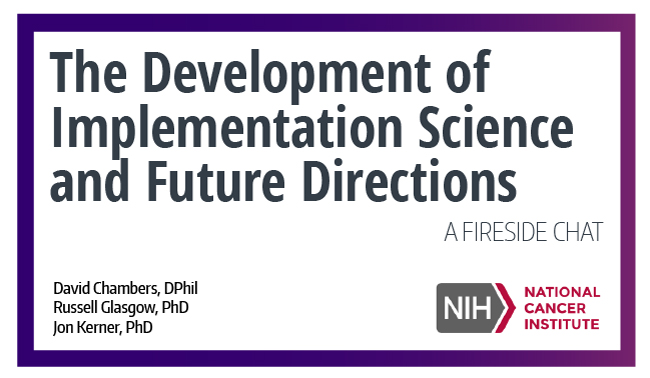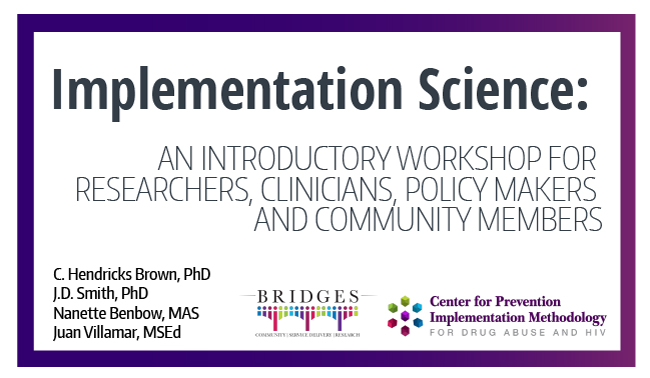
An Introduction to the Science
Interventions and evidence based practices that are poorly implemented – or not implemented at all – do not produce expected health benefits. Even when effectively implemented, interventions and practice changes still might not produce expected health benefits if effectiveness is lost during implementation, or if the intervention or practice was never effective in the first place.
Implementation science is the scientific study of methods and strategies that facilitate the uptake of evidence-based practice and research into regular use by practitioners and policymakers.
The field of implementation science seeks to systematically close the gap between what we know and what we do (often referred to as the know-do gap) by identifying and addressing the barriers that slow or halt the uptake of proven health interventions and evidence based practices.

Open Access articles are marked with the symbol ✪ and free online resources are marked with the symbol 💻. Please note that some articles will require a journal subscription to access the full text.
Defining Implementation Science
As it is a fairly new field of study, there are many published definitions of implementation science which range from narrow to broad. Some definitions emphasize closing the know-do gap, where others emphasize producing generalizable knowledge or locally fit solutions. Examples of the range of definitions include:
- ✪ Glasgow, Eckstein, and ElZarrad (2013): Implementation science is the 'application and integration of research evidence in to practice and policy.'
- ✪ Allottey et al (2008): Implementation science is 'applied research that aims to develop the critical evidence base that informs the effective, sustained and embedded adoption of interventions by health systems and communities.'
- Peters et al (2013): Implementation science is 'the scientific inquiry into questions concerning implementation — the act of carrying an intention into effect, which in health research can be policies, programmes, or individual practices (collectively called interventions).'
- 💻 National Institutes of Health, National Cancer Institute: 'Implementation science is the study of methods to promote the adoption and integration of evidence-based practices, interventions, and policies into routine health care and public health settings to improve the impact on population health.'
The Implementation Science Program in the UW Department of Global Health sees the fundamental question of implementation science as: How do we get "what works" to the people who need it, with greater speed, fidelity, efficiency, quality, and relevant coverage? This inclusive stance values the systematic application of research methods from a range of diverse disciplines that are seen as critical for understanding the process, context, and outcomes of implementation, with an end goal of enabling scale-up and population-level benefits. Although not exhaustive, the DGH Implementation Science Program embraces ten main research methods for implementation science.
Overlapping fields of study
There are several other newly emerging fields of science that overlap with implementation science, including improvement science, knowledge translation, program science, and delivery science. The main distinction between these highly related fields is their focal point.
Improvement science ‘deploys rapid tests of change to guide the development, revision and continued fine-tuning of new tools, processes, work roles and relationships’ and is ‘a methodology for using disciplined inquiry to solve a specific problem of practice,’ (💻 Improvement Science at the Carnegie Foundation).
The focus of improvement science is narrower than implementation science, as it seeks to maximize the impact of lessons learned from a specific improvement effort with the intent to maximize local benefits from local solutions.
Delivery science ‘is applied research that evaluates clinical or organizational practices that systems can implement or encourage’ (✪ Lieu & Madvig, 2019), and has a broad focus compared to implementation science, targeting health systems strengthening and addressing the societal factors that impact public policy and system functioning.
Knowledge translation is ‘the exchange, synthesis, and ethically sound application of researcher findings with a complex system of relationships among researchers and knowledge users,’ (✪ Khalil, 2016). Where knowledge translation differs from implementation science is that KT does not cover how to implement knowledge.
Program science is focused on ‘the totality of a program, including an appraisal of the epidemic transmission dynamics, setting appropriate prevention objectives by sub-population, selecting and combining interventions and allocating resources between interventions accordingly’ (💻 Program Science: The Concept and Applications). Implementation science focuses on the uptake of an evidence-based practice into programmatic settings, but not on improvement of a whole program in and of itself.
Distinguishing implementation science from intervention research
Implementation science differs from intervention research in that it focuses on the strategies used to implement evidence based practices, rather than on intervention effectiveness.
Typical implementation science foci
Aim: To evaluate an implementation strategy
Intervention: Directed at clinician behavior, and/or organizational practice change
Outcomes: Acceptability, adoption, appropriateness, feasibility, fidelity, implementation cost, penetration, and sustainability
Unit of analysis and randomization: The clinician, team, facility, or organization
Watch
Learn More
✪ Implementation of Implementation Science Knowledge: The Research-Practice Gap Paradox (Worldviews on Evidence-Based Nursing, 2019)
✪ Traveling Without a Map: An Incomplete History of the Road to Implementation Science and Where We May Go from Here (Administration and Policy in Mental Health and Mental Health Services Research, 2020)
✪ Implementation science made too simple: A teaching tool (Implementation Science Communications, 2020)
✪ An orientation for new researchers to key domains, processes, and resources in implementation science (Translational Behavioral Medicine, 2018)
💻 NCI's Implementation Science Research & Practice Tools (National Cancer Institute, 2020)
💻 Policymaking Is Not a Science (Yet) (Ep. 405) (Freakonomics, 2020)
✪ Roles dissemination and implementation scientists can play in supporting research teams (Implementation Science Communications, 2021)
✪ Implementation science: What is it and why should I care? (Psychiatry Research, 2019)
✪ Implementation Research in Health: A Practical Guide (WHO Press, 2013)
Implementation research: What it is and how to do it (British Journal of Sports Medicine, 2014)
✪ An introduction to implementation science for the non-specialist (BMC Psychology, 2015)
✪ The struggle of translating science into action: Foundational concepts of implementation science (Journal of Evaluation in Clinical Practice, 2017)
Implementation Research in Mental Health Services: An Emerging Science with Conceptual, Methodological, and Training Challenges (Administration and Policy in Mental Health and Mental Health Services Research, 2009)
National Institutes of Health Approaches to Dissemination and Implementation Science: Current and Future Directions (American Journal of Public Health, 2012)
Implementation science in healthcare: Introduction and perspective (The Journal of Evidence and Quality in Health Care, 2015)
Bridging the Gap Between Research and Practice: Implementation Science (Journal of Speech, Language, and Hearing Research, 2015)
✪ Strategies for implementing implementation science: A methodological overview (Emergency Medicine Journal, 2015)
✪ Bridging the Chasm: Challenges, Opportunities, and Resources for Integrating a Dissemination and Implementation Science Curriculum into Medical Education (Journal of Medical Education and Curricular Development, 2018)




